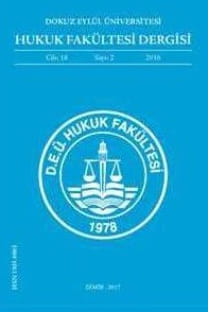ULUSLARARASI HUKUK VE DENİZDE YASADIŞI FAALİYETLERİN ÖNLENMESİ
Günümüzde deniz taşımacılığının boyutları düşünüldüğünde denizde yasadışı faaliyetlerin önlenmesine ilişkin kuralların önemi ortaya çıkmaktadır. Tarih boyunca denizcilik başta deniz haydutluk olmak üzere önemli tehlikelere açık bir faaliyet alanı olarak görülmüştür. Denizde yasadışı faaliyetlerin önlenmesine ilişkin ilk düzenleme deniz haydutluğu ile mücadeleye ilişkindir. 1982 BMDHSde haydutluğun tanımı yapılmış ve haydutlukla mücadelenin sağlanması için evrensel yetki kuralı kabul edilmiştir. Ancak belirtilmesi gerekir ki, Sözleşmede haydutluğun oluşması bazı ağır şartlara bağlandığı ve suç oldukça sınırlandırıldığı için günümüz gereksinmelerine cevap vermekten uzaktır. Bu sebeple daha yakın tarihlerde 1988 yılında Denizde Seyir Güvenliğine Karşı Yasadışı Eylemlerin Önlenmesine Dair Sözleşme (1988 SUA Sözleşmesi) yapılmıştır. Bu Sözleşmede haydutluk olarak nitelenemeyecek bazı fiiller suç haline getirilmiş; deniz güvenliğine ilişkin kuralların uygulanacağı coğrafi alan genişletilmiş ve iade et ya da yargıla ilkesi ile sanıkların yargılanması sağlanmıştır. Son olarak yapılan düzenleme ise denizde söz konusu olabilecek terörist saldırıların önlenmesine yöneliktir. 2005 SUA Protokolü ile de yeni bazı fiiller suç haline getirilmiş; ayrıca açık denizde gemilere müdahaleye ilişkin ayrıntılı kurallar benimsenmiştir.
INTERNATIONAL LAW AND PREVENTION OF UNLAWFUL ACTS AT SEA
Today the capacity of the maritime transport reveals the importance of the rules on the prevention of unlawful acts at sea. Throughout the history maritime navigation has been regarded as an activity prone to danger. The first regulations regarding the prevention of unlawful acts at sea was piracy. Piracy was defined in 1982 UNCLOS and universal jurisdiction was accepted as a tool for prosecution guarantee. However, it must be mentioned that there has been high threshold for an unlawful act to be regarded as a piracy. The definition of piracy so limited that it cannot meet the current necessities. For that reason 1988 Convention on the Suppression of Unlawful Acts Against the Safety of Maritime Navigation was adopted. In this Convention some unlawful acts that cannot be regarded as piracy had been regulated as crimes, the geographical area has been extended and the prosecution of the accused was guaranteed by the principle of aut dedere aut iudicare. The last regulation is about the prevention of terrorist acts at sea. Again with the 2005 SUA Protocol some new unlawful acts have become crimes and detailed rules regarding interdiction to ships has been adopted.
___
- Balkin, Rosalie: The International Maritime Organization and Maritime Security, 30 Tul. Mar. L. J. (Winter/Summer, 2006), s. 1-35.
- Batır, Kerem: Yirmi Birinci Yüzyılda Deniz Haydutluğu ve Uluslararası Hukuk, USAK Yayınları, Ankara, 2011.
- Beckman, R. C.: The 1988 SUA Convention and 2005 SUA Protocol: Tools to Combat Piracy, Armed Robbery, and Maritime Terrorism, Herbert-Burns R./Bateman, S./Lehr, P. (eds.), Lloyds MIU Handbook of Maritime Security, CRC Press, 2009.
- Bento, Lucas: Toward an International Law of Piracy Sui Generis: How the Dual Nature of Maritime Piracy Law Enables Piracy to Flourish, Berkley Journal of International Law, Vol: 29, iss.2, 2011.
- Boister, Neil: An Introduction to Transnational Criminal Law, Oxford University Press, Oxford, 2012.
- Brownlie, Ian: Principles of Public International Law, 6th ed., Oxford University Press, Oxford, New York, 2003.
- Canca, Hakan Selim: Denizde İşlenen Suçlar, Seçkin Yayınevi, Ankara, 2012.
- Churchill, R.R./Lowe, A.V.: The Law of the Sea, 2nd ed. Revised and enlarged, Manchester University Press, Manchester, 1988.
- Cryer, R.: et al, An Introduction to International Criminal Law and Procedure, 2nd ed., Cambridge University Press, Cambridge, 2010.
- Davidson, Scott: International Law and Suppression of Maritime Violence, Burchill, R./White, D.W./Morris, J. (eds.), International Conflict and Security Law, Essays in Memory of Hilaire McCoubrey, Cambridge University Press, Cambridge, 2014, s. 265-285.
- Gündüz, Aslan: Milletlerarası Hukuk, Temel Belgeler Örnek Kararlar, gen. 3. Baskı, Beta yayınları, İstanbul, 1998.
- Guilfoyle, Douglas: Shipping Interdiction and the Law of the Sea, Cambridge University Press, Cambridge, 2011.
- Hamid, A.G./Sein, K.M /Win, K.H.: Assessing the Viability of the 2005 Protocol to the Convention for the Suppression of Unlawful Acts Against the Security of Maritime Navigation, Australian Journal of Basic and Applied Sciences, 6(11), 2012, s. 137-144.
- Karim, Md Saiful: The Rise and Fall of the International Law of Maritime Terrorism: the ghost of piracy is still hunting!, New Zealand Un. Law Review, 26(1), s. 82-103.
- Keyuan, Zou: New Developments in the Law of Piracy, Chinese Journal of International Law, vol.8, iss.2, 2009, s. 323-345.
- Klein, Natalie: The Right of Visit and the 2005 Protocol on the Suppression of Unlawful Acts the Safety of Maritime Navigation, Denv. J. Int.l L. & Poly, vol.35:2, 2007, s. 287-332.
- Klein, Natalie: Maritime Security and Law of the Sea, Oxford University Press, Oxford, 2011.
- Kontorovich, Eugene: A Guantanamo on the Sea: The Difficulty of Prosecuting Pirates and Terrorists, 98 Cal. L. Rev., 2010.
- Kraska, James/Petrozo, Raul: International Maritime Security Law, Martinus Nijhoff Publishers, Leiden, Boston, 2013, s.801-859. Tuerk, Helmut, Combatting Terrorism at Sea-The Suppression of Unlawful Acts Against the Safety of Maritime Navigation, J. Miami Int.l & Comp. L. Rev., 2007-2008, s. 337, vd.
- UNCTAD, Maritime Piracy: Part II An Overwiev of the International Legal Framework and of Multilateral Cooperation to Combat Piracy, Studies in Transport Law and Policy, UNCTAD, New York and Geneva, 2014, No:2.
- Shaw, Malcolm N.: International Law, sixth ed., Oxford University Press, Oxford, 2008.
- Wolfrum, Rudiger: Fighting Terrorism at Sea: Options and Limitations under International Law, Twenty-Eighth Doherty lecture delivered by the author in Washington D.C., 13 April 2006, organized by the Center for Oceans Law and Policy, University of Virginia School of Law, Charlottesville, Virginia, USA.
- ISSN: 1303-6963
- Yayın Aralığı: Yılda 2 Sayı
- Başlangıç: 1980
- Yayıncı: Serdar Nart
Sayıdaki Diğer Makaleler
Neoliberal Politikalar ve İnsan Hakları
FİİLİ VEYA HUKUKİ İMKANSIZLIĞIN İDARİ İŞLEME ETKİSİ ÜZERİNE BİR DENEME
Fiili veya Hukuki İmkansızlığın İdari İşleme Etkisi Üzerine Bir Deneme
NEOLİBERAL POLİTİKALAR VE İNSAN HAKLARI
Uluslararası Hukuk ve Denizde Yasadışı Faaliyetlerin Önlenmesi
